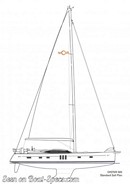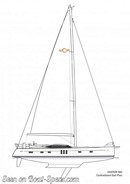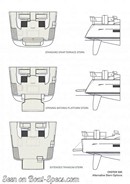Oyster 565 Keel and centerboard
Sailboat specifications
The Oyster 565 is a 56’6” (17.22m) cruising sailboat designed by Humphreys Yacht Design (United Kingdom). She is built since 2019 by Oyster (United Kingdom). The Keel and centerboard version features a centerboard inside of a short fin-keel allowing shoal draft while maintaining upwind capabilities.
The Oyster 565 is as well listed, on Boat-Specs.com, in Standard version (see all the versions compared).
Find out more about the Oyster 565 on Boat-Spec's blog: European Yacht of the Year 2020 nominated sailboats.
The Oyster 565 is as well listed, on Boat-Specs.com, in Standard version (see all the versions compared).
Find out more about the Oyster 565 on Boat-Spec's blog: European Yacht of the Year 2020 nominated sailboats.
Oyster 565's main features
- Model
- Oyster 565
- Version
- Keel and centerboard
- Hull type
- Monohull
- Category
- Offshore cruising sailboat
- Sailboat builder
- Sailboat designer
- Country
- United Kingdom
- Construction
- Hull and deck: GRP (glass reinforced polyester)
- First built hull
- 2019
- Last built hull
- Still in production
- Appendages
- Centerboard : pivoting centerboard in the keel
- Helm
- Twin helm wheels
- Rudder
- Twin spade rudders
- Unsinkable
- No
- Trailerable
- No
- EC design categoryiThe CE design category indicates the ability to cope with certain weather conditions (the sailboat is designed for these conditions)
A: Wind < force 9, Waves < 10m
B: Wind < force 8, Waves < 8m
C: Wind < force 6, Waves < 4m
D: Wind < force 4, Waves < 0,5m - A
- Standard public price ex. VAT (indicative only)
- About1 460 000 €(2019)
Oyster 565's main dimensions
- Overall length
- 59’ 5”18.09 m
- Hull length
- 56’ 6”17.22 m
- Waterline length
- 52’ 4”15.93 m
- Beam (width)
- 16’ 10”5.13 m
- Draft
- 13’3.96 m
- Draft when appendages up
- 5’ 5”1.66 m
- Mast height from DWL
- 81’ 1”24.73 m
- Light displacement (MLC)
- 56372 lb25570 kg
Oyster 565's rig and sails
- Upwind sail area
- 1765 ft²164 m²
- Rigging type
- Sloop Marconi (in-mast furling mainsail) 9/10
- Mast configuration
- Keel stepped mast
- Rotating spars
- No
- Number of levels of spreaders
- 2
- Spreaders angle
- Swept-back
- Spars construction
- Aluminum spars
- Standing rigging
- 1x19 strand wire discontinuous
Oyster 565's performances
- Upwind sail area to displacementiThe ratio sail area to displacement is obtained by dividing the sail area by the boat's displaced volume to the power two-thirds.
The ratio sail area to displacement can be used to compare the relative sail plan of different sailboats no matter what their size.
Upwind: under 18 the ratio indicates a cruise oriented sailboat with limited performances especially in light wind, while over 25 it indicates a fast sailboat. - 203 ft²/T18.9 m²/T
- Displacement-length ratio (DLR)iThe Displacement Length Ratio (DLR) is a figure that points out the boat's weight compared to its waterline length. The DLR is obtained by dividing the boat's displacement in tons by the cube of one one-hundredth of the waterline length (in feet).
The DLR can be used to compare the relative mass of different sailboats no matter what their length:
a DLR less than 180 is indicative of a really light sailboat (race boat made for planning), while a DLR greater than 300 is indicative of a heavy cruising sailboat. - 179
- Critical hull speediAs a ship moves in the water, it creates standing waves that oppose its movement. This effect increases dramatically the resistance when the boat reaches a speed-length ratio (speed-length ratio is the ratio between the speed in knots and the square root of the waterline length in feet) of about 1.2 (corresponding to a Froude Number of 0.35) . This very sharp rise in resistance, between speed-length ratio of 1.2 to 1.5, is insurmountable for heavy sailboats and so becomes an apparent barrier. This leads to the concept of "hull speed".
The hull speed is obtained by multiplying the square root of the waterline length (in feet) by 1.34. - 9.69 knots
Oyster 565's auxiliary engine
- Engine(s)
- 1 inboard engine
- Engine(s) power
- 150 HP
- Fuel type
- Diesel
- Fuel tank capacity
- 251 gal950 liters
Oyster 565's accommodations and layout
- Cockpit
- Center cockpit
- Cabin(s)
- 3
- Berth(s) (min./max.)
- 6 / 8
- Head(s)
- 2
- Freshwater tank capacity
- 198.1 gal750 liters














Oyster 565 interior and accommodations - - 13/19
Picture extracted from the commercial documentation © Oyster
Picture extracted from the commercial documentation © Oyster


Oyster 565 interior and accommodations - - 14/19
Picture extracted from the commercial documentation © Oyster
Picture extracted from the commercial documentation © Oyster


Oyster 565 interior and accommodations - - 15/19
Picture extracted from the commercial documentation © Oyster
Picture extracted from the commercial documentation © Oyster


Oyster 565 interior and accommodations - - 16/19
Picture extracted from the commercial documentation © Oyster
Picture extracted from the commercial documentation © Oyster


Oyster 565 interior and accommodations - - 17/19
Picture extracted from the commercial documentation © Oyster
Picture extracted from the commercial documentation © Oyster


Oyster 565 interior and accommodations - - 18/19
Picture extracted from the commercial documentation © Oyster
Picture extracted from the commercial documentation © Oyster


Oyster 565 interior and accommodations - - 19/19
Picture extracted from the commercial documentation © Oyster
Picture extracted from the commercial documentation © Oyster
Similar sailboats that may interest you:
Sailboats
First built hull
Hull length
1988
52’ 6”16 m
2010
63’ 1”19.22 m
2011
57’ 4”17.48 m
2010
57’ 6”17.53 m
2011
62’ 5”19.03 m
2013
52’ 11”16.12 m
2014
65’ 4”19.89 m
2014
71’ 8”21.86 m
2013
52’ 11”16.12 m
2000
52’ 6”16 m
2017
50’ 11”15.51 m
2017
57’ 4”17.48 m
2019
56’ 6”17.22 m
2020
57’ 4”17.48 m
2019
59’ 6”18.14 m